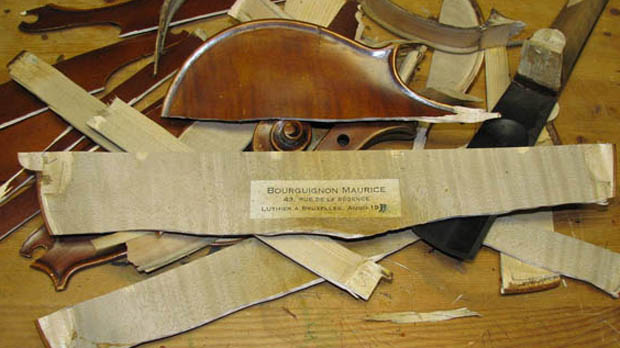Destroyed eBay violin ‘could have been saved’
As payment website PayPal is accused of ordering the buyer of an antique violin to destroy it, a commercial lawyer tells Channel 4 News the drastic action could have been avoided.

A valuable French violin was apparently smashed to pieces after a buyer on auction site eBay reported it as counterfeit.
The tale came to light on the regretsy.com blog, a website about unusual handmade objects, and has caused an internet storm.
The violin’s seller, known only as “Erica”, said the musical instrument which “made it through world war two” had been sold for $2,500 before its authenticity was disputed.
“Rather than have the violin returned to me, PayPal made the buyer DESTROY the violin in order to get his money back,” she wrote.
“They somehow deemed the violin as ‘counterfeit’ even though there is no such thing in the violin world.
“In the violin market, labels often mean little and there is often disagreement over them. Some of the most expensive violins in the world have disputed labels, but they are works of art nonetheless.”
The distressed violin owner could very well have rights against PayPay/eBay for compensation. Vanessa Barnett, lawyer
PayPal’s privacy policy prevents it from commenting on individual cases.
But a spokesperson for the firm said: “We carefully review each case, and in general we may ask a buyer to destroy counterfeit goods if they supply signed evidence from a knowledgeable third party that the goods are indeed counterfeit.”
However a commercial lawyer has told Channel 4 News that “common sense” may have failed.
Vanessa Barnett, who specialises in advising online businesses, said: “PayPay could have avoided the buyer destroying the violin – there are contract terms which prescribe this, but PayPay was under no obligation to choose to act on those contract terms. It seems that at some point discretion and common sense fell by the wayside.
“There is also an argument that such a term is an unfair term under consumer law – the distressed violin owner could very well have rights against PayPay/eBay for compensation.”
“Erica” said the instrument was sold to a Canadian buyer who “was proud of himself” so “sent me a photo of the destroyed violin” (Pictured above).
She added: “I am now out a violin… as well as $2,500.”
But Rod Ward, a UK-based violin-maker, warns against buying or selling a musical instrument on the internet, without arranging to play it first.
He told Channel 4 News: “The thing about buying or selling old instruments and dealing in them is you need a great deal of experience to do it efficiently and honestly.
“You really need to see them to see what they are – details on eBay are not that accurate.”
But he agreed with “Erica” that the violin should not have been judged on its label.
“The thing about labels is that anyone in the business wouldn’t take notice of labels and there are people who actually sell fake labels.”
“Old instruments are sold much more on their provenance than their sound,” he added.
“And they range in value from 50 quid to £17 million!”